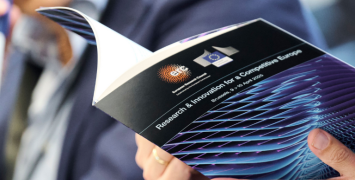
As leaders from industry, policy and science gathered in Brussels for a lively exchange this spring, one message resonated wide and clear: Europe’s future success and competitiveness depends on our strong commitment to investing in cutting-edge science.
Participants at the workshop engaged in unsparing analyses of the structural challenges Europe is facing. Several drew attention to the fragmentation of the single market – different national implementations of EU legislation, the absence of a true financial union, incompatible standards, duplication of efforts across Member States – but also to insufficient R&D funding, and a risk-averse regulatory culture. These barriers limit the scale and impact European innovators can achieve. Addressing them is essential if we are to complete a truly integrated and competitive Europe.
Crucially, the participants stressed that addressing these issues requires long-term, risk-tolerant support for science - especially frontier research that cannot thrive under short funding cycles or narrow industrial objectives.
For years, the call for greater support has echoed through Europe’s research policy and academic circles. Today, that call is being answered with a new sense of urgency and unity. European Commission President Ursula von der Leyen has placed research and innovation at the top of the agenda, saying that it is ‘at the heart of the European economy’. Meanwhile, the influential Draghi report warns against complacency: Europe risks becoming specialised in the industries of the past, while global competitors surge ahead in high-tech sectors. To keep pace, Europe must step up its investment in research.
This is a momentum we cannot afford to miss. And in many ways, we are in a better position than ever before to act. Our universities and research institutions are world-class, hosting a wealth of talent. European labs play an important role in brain circulation and building the networks we need, and Europe boasts large-scale research infrastructures that are exemplary globally.
At the European Research Council, we see every day how investment in frontier research pays dividends for society, industry, and the economy. In many ways, frontier research is the wellspring from which tomorrow’s industries will flow. It is about bold ideas – discoveries that redefine what is possible.
But to realise our full potential, we need a step-change in support. This means not only increased funding, but also a renewed commitment to scientific excellence and independence.
What struck me at our Brussels event was how the diversity of perspectives - from different countries, sectors, and disciplines - lent real strength and credibility to a shared message: fundamental research is not a luxury. It is the very bedrock of innovation.
Industry leaders shared how their most transformative advances sprang from fundamental research. Policy-makers in this discussion outlined ambitious plans to strengthen Europe’s research landscape. Scientists who took part, a Nobel laureate and ERC grantees, emphasised how curiosity-driven exploration is immensely important for inventing tomorrow’s technologies.
This workshop wasn’t about promoting any one agenda; it was about listening and identifying what must change if Europe wants to stay competitive. Across the board, there was a shared recognition of the need for collaboration, and for a research system that is open, dynamic, and responsive to societal needs.
Yet, we cannot take progress for granted. Complex geopolitics, shifting policy priorities, increasing fragmentation, and budgetary constraints all pose real risks. As Robbert Dijkgraaf – famed scientist, President-elect of the International Science Council and former Minister of Education, Culture and Science in the Netherlands - summarised it at our debate: ‘There is a certain risk of politicising science, while I think it is much better to “scientise” politics - that is, to set our policy to maximise the power of science to solve our challenges.’
The European Research Council will continue this constructive discussion, keeping open lines of communication with industry, policy-makers, and the scientific community to build an environment where bold ideas can flourish, and Europe’s brightest and most creative minds have the support they need.
The consensus is clear: the goal is not to compete in a global race, but to ensure that Europe becomes the best place to do research, innovation and business. Our success depends not on treating science and research merely as tools for competitiveness, but on recognising them as foundational to Europe’s long-term strategy.
Maria Leptin, President of the European Research Council (ERC)




